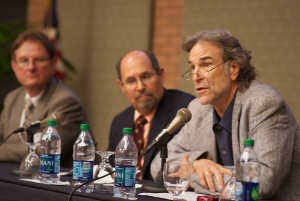USC School of Social Work Forum Addresses Homeless Care
May 07, 2012 / by Susan Wampler- Giving
- Research
Homeless persons are among the most marginalized in the United States, suffering alarming morbidity and mortality rates. Homelessness afflicts the young and the old, individuals and families, and intersects with issues of serious mental illness, substance use and a host of other health risks—all of which pose serious challenges to providing adequate service. These concerns are especially acute in Southern California. With the homeless population in Los Angeles County numbering nearly 48,000 on any given day, this is the nation’s capital of homelessness, and Los Angeles has held that ignoble distinction since the mid-1980s.
However, new integrated care models hold promise for coordinated, cost-effective and proactive delivery of comprehensive services that address the individual needs of homeless persons, with the ultimate aim of ending homelessness altogether. Research has shown that integrated care, combined with permanent housing for homeless people with significant disabilities, actually saves money in the long term—in addition to alleviating the human costs.
To increase understanding and identify key challenges and strategies for advancing and sustaining such efforts, the USC School of Social Work convened a forum on “Integrated Care and Housing for Homeless Persons in Los Angeles” on April 19 at the USC Davidson Conference Center. Organized and led by Suzanne Wenzel, professor and director of the school’s research cluster on homelessness, the daylong conference united more than 100 attendees, including government officials, agency administrators, research scientists, direct-service providers and other advocates focused on serving the diverse needs of the region’s homeless.
USC School of Social Work Dean Marilyn Flynn noted the longstanding national gap in information-sharing between university researchers and community practitioners.
“I hope one of today’s outcomes will be a process that allows us to begin this mutual translation,” she said.
City Councilwoman Jan Perry delivered the keynote address. Perry, who successfully pushed the county to fund year-round emergency shelters, spoke about the plight of the homeless and the challenges facing agencies trying to help them.
“Single mothers with poor education are at great risk of becoming homeless,” she said, adding that older adults increasingly are faced with the threat of losing their homes.
She then pointed to the disturbing statistic that African-American men comprise 47 percent of the homeless population. Although Perry also outlined the progress made in providing shelter and services, she stressed that much work remains to be done, that the city cannot bear the burden alone and that federal cutbacks will worsen the problem.
Two panel discussions—one providing an agency and administrative overview on integrated care in the housing continuum, and another on the state of the science on integrated care—gave participants an opportunity to hear from, and share their thoughts with, local leaders in these two critical areas. The first panel featured Elizabeth Boyce, homeless services coordinator for the Los Angeles County Chief Executive Office; Chris Ko, program officer for housing stability at United Way of Greater Los Angeles; Peter Lynn, director of the Section 8 Department, Housing Authority of the City of Los Angeles; Marvin Southard, director of the Los Angeles County Department of Mental Health; and John Viernes, director of substance abuse prevention and control for the Los Angeles County Department of Public Health.
“Housing with the right level of integrated support of services is the solution and what will end homelessness,” said Boyce, acknowledging that is “no easy task.”
She then pointed to the successes of Project 50, which provided housing to 50 homeless people on Skid Row who were identified as the most vulnerable and likely to die on the street. That project’s success, Boyce says, “now has been replicated to the tune of about Project 600 or Project 700.”
Ko discussed “Home for Good,” a five-year, community-wide initiative to end chronic and veteran homelessness throughout the county. “The way we used to do things, it’s not possible to get to that goal,” he said. “Having that goal forces us to change the way we do things.”
The second panel was composed of John Brekke, the Frances G. Larson Professor of Social Work Research and head of the school’s persistent mental illness research cluster; Michael Cousineau, associate professor of research at the Keck School of Medicine of USC; and Lawrence Palinkas, the Albert G. and Frances Lomas Feldman Professor of Social Policy and Health and head of the behavioral health research cluster at the School of Social Work.
Homeless individuals die 25 years earlier than the rest of the population—usually from preventable health conditions, Brekke told the crowd. He then shared data on the effectiveness of training peers as health navigators.
“To watch people get good integrated care, and the impact that has on their lives and their mental health is extraordinary,” he said. “Frankly, it’s the most rewarding work I’ve done in 30 years in the field of mental health.”
Palinkas noted that “the success or failure of systems integration really depends on the quality of relationships … between different specialties, agencies, systems of care and organizational cultures.”
Toward that end, the event concluded with findings from the day’s breakout workshops on building partnerships for sustainable integrated care. A white paper summarizing the forum and its numerous takeaways is being developed to share with participants and other key players dedicated to addressing homelessness in Los Angeles County.
“This day can serve as a platform for ongoing collaboration and research that can specifically address challenges we’re facing and that can facilitate innovative solutions,” Wenzel said.
The forum was underwritten by Scott and Obaida Watt.
To reference the work of our faculty online, we ask that you directly quote their work where possible and attribute it to "FACULTY NAME, a professor in the USC Suzanne Dworak-Peck School of Social Work” (LINK: https://dworakpeck.usc.edu)
